Financial Blogging How To Write Powerful Posts That Attract Clients
Welcome to the 8th annual blogging survey.
Years ago, we set out to answer some basic questions about blogging. It's grown into a long-term project that tracks trends in the changing world of blogging and content marketing.
Each year, we ask 1000+ bloggers 20 questions about their process and their content. Then we analyze, make a bunch of charts and add input from a dozen content marketing experts.
This year we had 1067 survey responses. What follows are 35 charts based on those responses, 12 experts and hundreds of blogging statistics that reveal some fascinating insights into an industry in flux, now more than ever.
Blogging still works, but driving big results is a challenge
Let's begin at the end, with the question about blogging effectiveness. We asked each blogger if they are achieving strong results, some results or disappointing results.
Of course, "strong results" is subjective and relative to the goals of each blogger. There are 600+ million blogs (source) with a huge range of goals: fame and fortune, reach and revenue, links and lead generation.
There are other surveys that try to understand why people blog. The reasons are vast, as you can imagine. The purpose of this survey is to show you what's working now, regardless of your goals. This report is practical data for the content marketer.
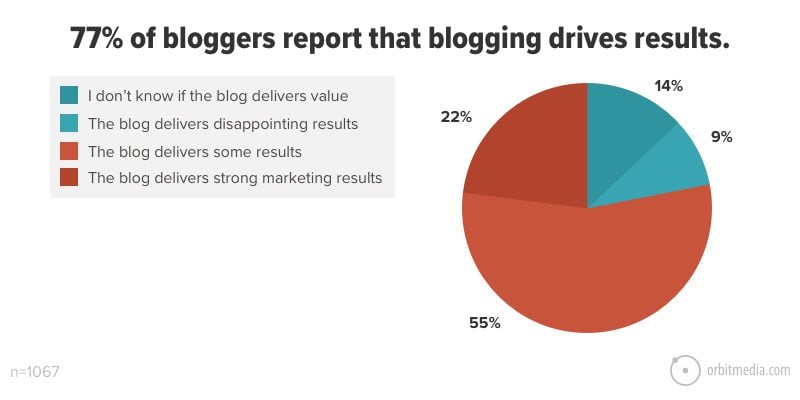
1 in 5 bloggers report "strong results." This is our benchmark. We'll use this number to find correlations between various tactics and success. Some tactics correlate with a higher likelihood of strong results. Others, not so much.
Here is the trend. The percentage of respondents who report "strong results" has declined slightly over the last few years.
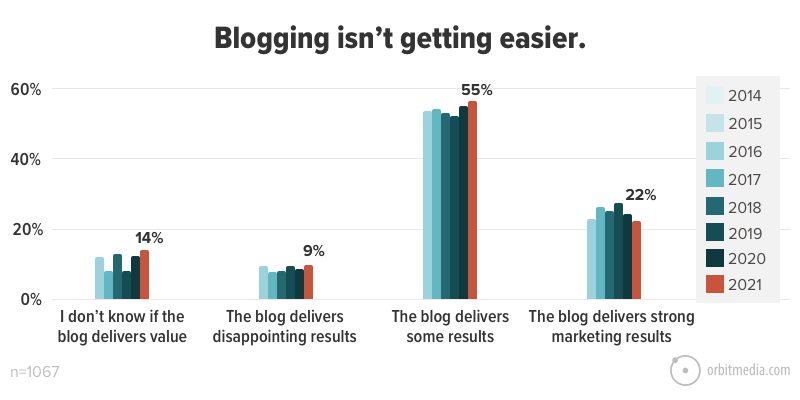
 | Ann Handley, Marketing Profs" Roughly a quarter of the bloggers surveyed — 23% total — either a) throw up the shrug emoji re blog results (we just don't know!) or b) they are disappointed with results. That can't be true… can it? Why would that be? Why does Club 23% exist at all? My Theory #1 is that the writers are working in a silo from the rest of the team. Maybe MOPS looks at results. But maybe MOPS doesn't share results in any useful way with the writers? So writers are just mad about it? OR Theory #2: Maybe bloggers are wearing lots of other hats (and walking in lots of other shoes), so they don't pause to see what's working/what's not/what might work better. OR Theory #3: <….> Honestly at a loss. My advice to Club 23%: Figure out a feedback loop. Let's find out what's working/what's not. It's critical to making more strategic decisions and getting content the respect it richly deserves. And… if results are disappointing? Let's fix that! This report literally can show you how. " |
Now we have the big picture and the benchmark for success, let's get into the specifics.
1. How long does it take to write a blog post?
Ever wonder? Here's the answer: the average blog post takes just over four hours to write.
We average the answers from the 1000 bloggers to see how much time we're all spending on this stuff. It's a lot. And it's increasing. The time spent per post is higher than ever. Bloggers spent 67% more time per post in 2021 than in 2014.
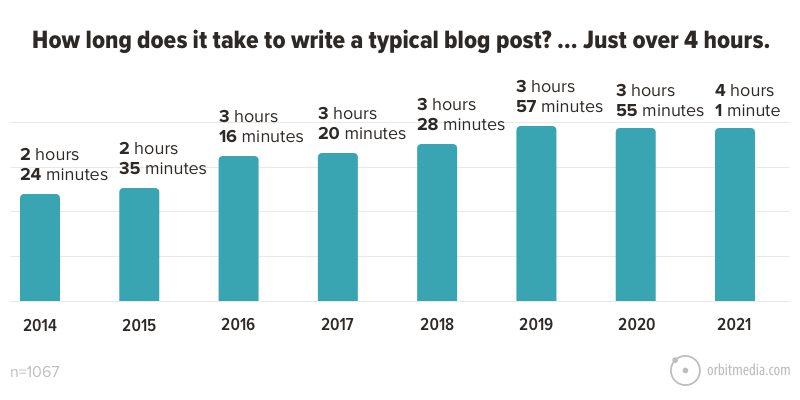
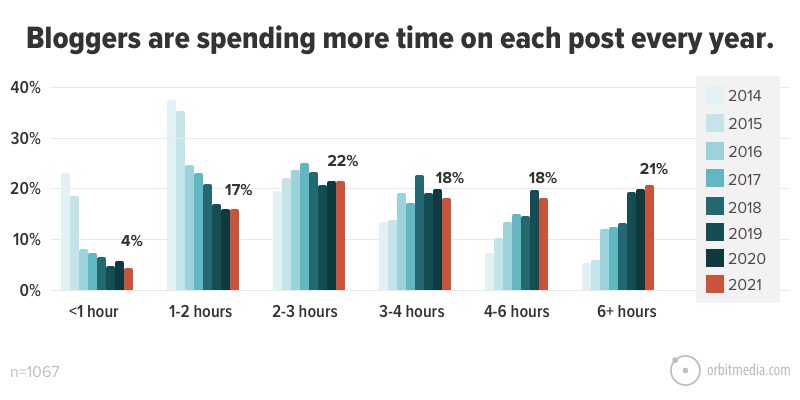
Does the extra effort pay off? Yes. But only when there's enough of it.
There isn't much difference in the probability of reporting "strong results" for bloggers who spend 2-6 hours per post. But the really serious bloggers who put in 6+ hours on average are far more likely to report strong results.
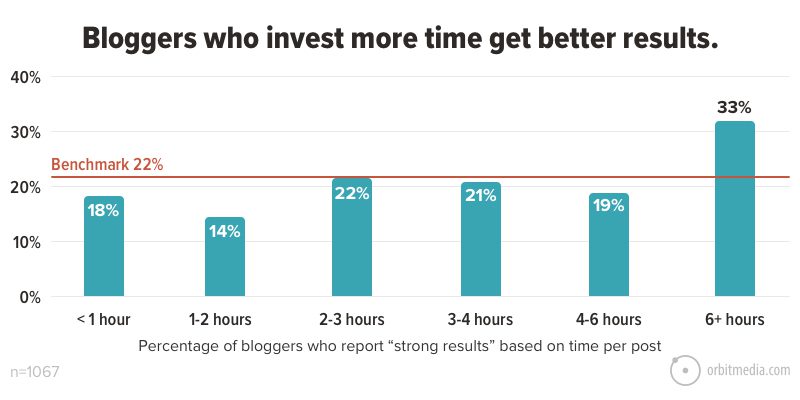
2. Trends in blog post length: How long is a typical blog post?
Where does the time go? Into longer posts. The average blog post is 1416 words. Longer than ever.
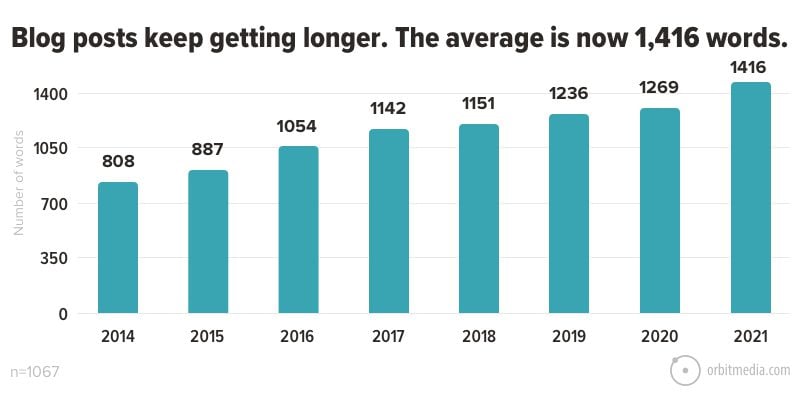
Here we see the trend over the years. Writing 1500+ word articles was once very rare. Now it's quite common. The relative popularity of short and long blog articles has flipped.
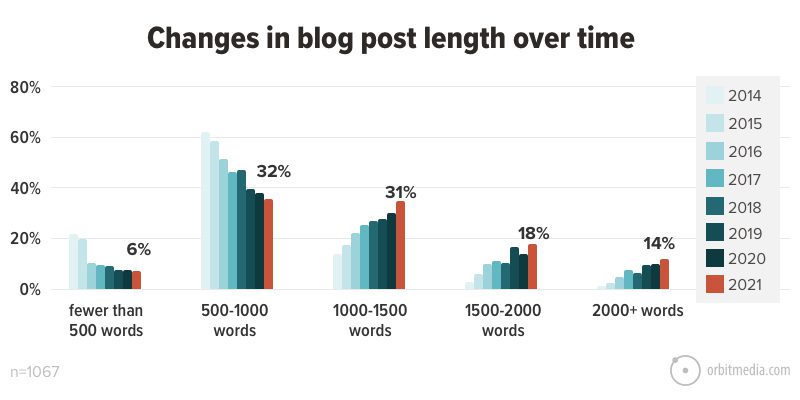
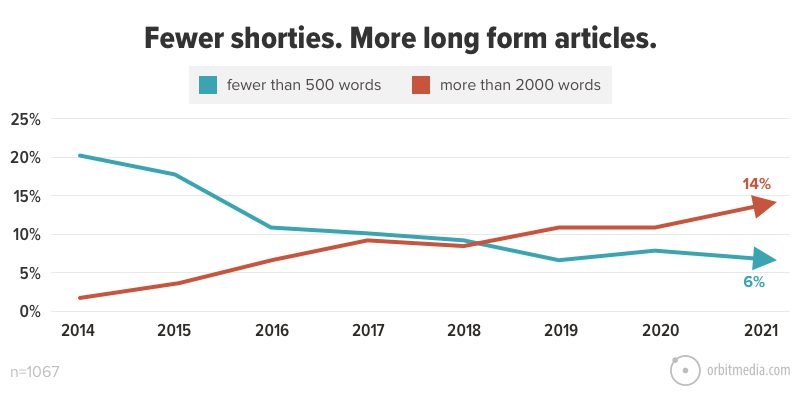
But very few bloggers write very long articles. Just 4% of bloggers write 3000+ words on average a typical post.
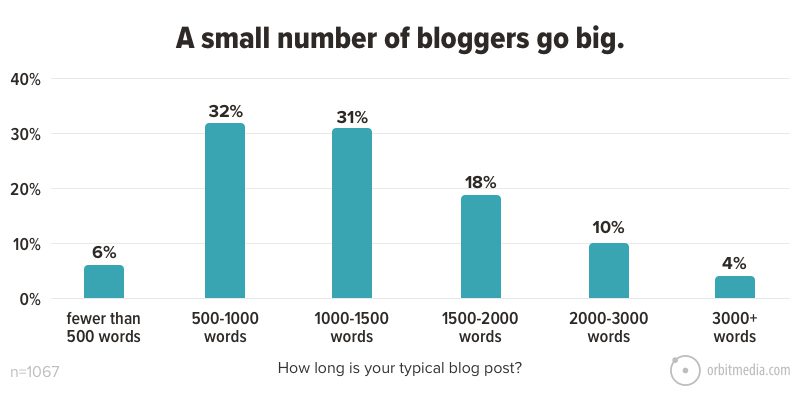
Is it working for them? Yes.
There are a ton of studies that show a direct correlation between length and results, particularly in search rankings. Year after year, the data has the same message: longer content performs better.
Note: The data does NOT tell us that every blog post must be 3000 words. Word count is a function of the topic. Big topics call for big content. Here is the best rule for blog post length: Every post should be as long as necessary to cover the topic completely, and not one word longer.
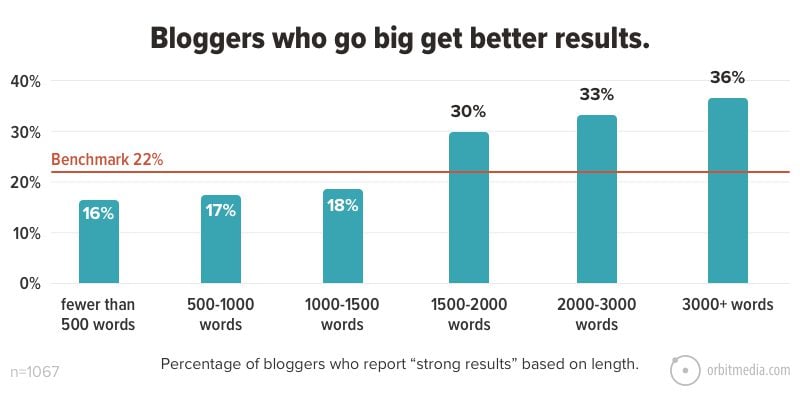
 | Brian Dean, Co-founder of Exploding Topics"The fact that the average blog post length has increased by 57% since 2014 doesn't surprise me. When it comes to Google rankings, social shares and backlinks, longer content tends to outperform short blog posts. Long-form blog content was a "secret weapon" a few years ago. But word has spread. Which has led to more and more bloggers focusing on long-form content." |
3. Trends in blogging frequency: How frequently do bloggers publish?
Publishing frequency is holding steady. Maybe it's down a smidge. About half of all bloggers publish weekly or "several posts per month."
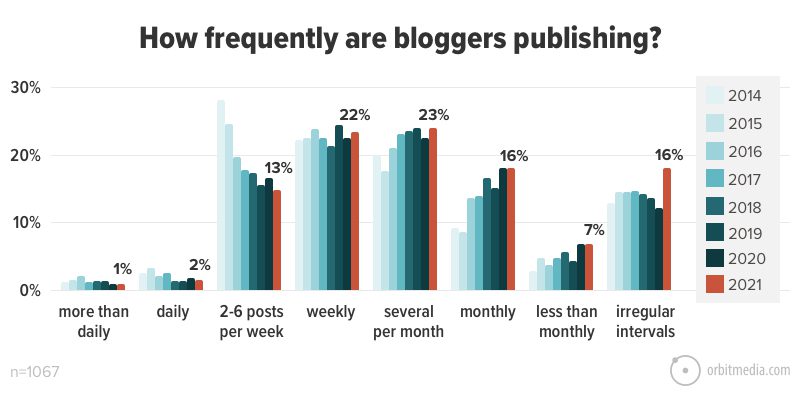
How does publishing frequency correlate with success?
Again, more is better. Bloggers who publish more often are more likely to report "strong results." This fits the pattern: bloggers who invest more effort get better outcomes.
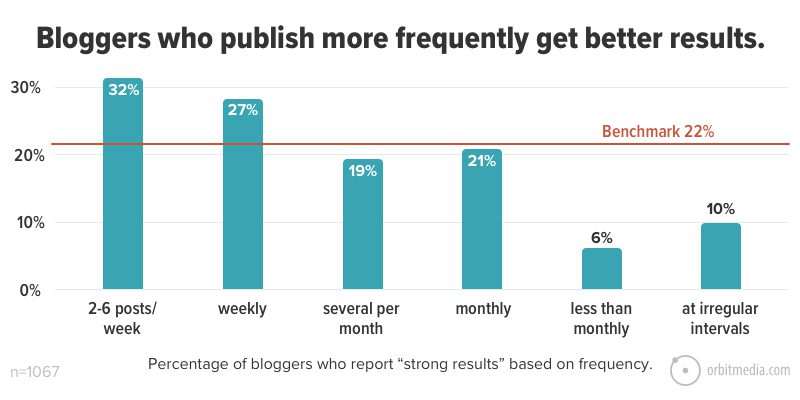
But who are these people? Are these the same bloggers that spend 6+ hours per article? No. There is virtually no overlap in the data between the high-frequency bloggers and long-form content bloggers.
Our friend, Mark Schaefer, suggests that we should be working on consistency, not frequency. As usual, he offers an insightful and challenging perspective:
 | Mark Schaefer, Businessesgrow.com" I have often said that consistency is more important than genius and we sort of see that validated in the survey — consistency bears results. I blogged 650 weeks in a row without missing. Sometimes I wondered if it was worth it. That's a lot of hard work but I realized that so many business benefits come from the blog. I know I would not be where I am today without that dedication. " |
4. Trends in blogging formats: What kinds of content are bloggers publishing?
Several of the survey questions related to the structure of the content itself. First, we see what formats bloggers are using. A few observations:
- How-to articles are the cornerstone of most content programs. The majority of bloggers write practical resources. Unsurprising.
- Lists remain very popular. Most bloggers use them.
- Interviews and roundups, the collaborative formats central to organic influencer marketing, are not very popular.
- Opinion-based content is down over the last several years, despite the fact that it is key to thought leadership marketing.
- Webinars have declined in popularity, from 29% in 2020 to 24% in 2021. Covid-related?
- Gated content has declined for the last three years in a row.
News and trends have declined in popularity. Maybe more bloggers are discovering that it's hard to be a legitimate news source and that news has little SEO value if any.
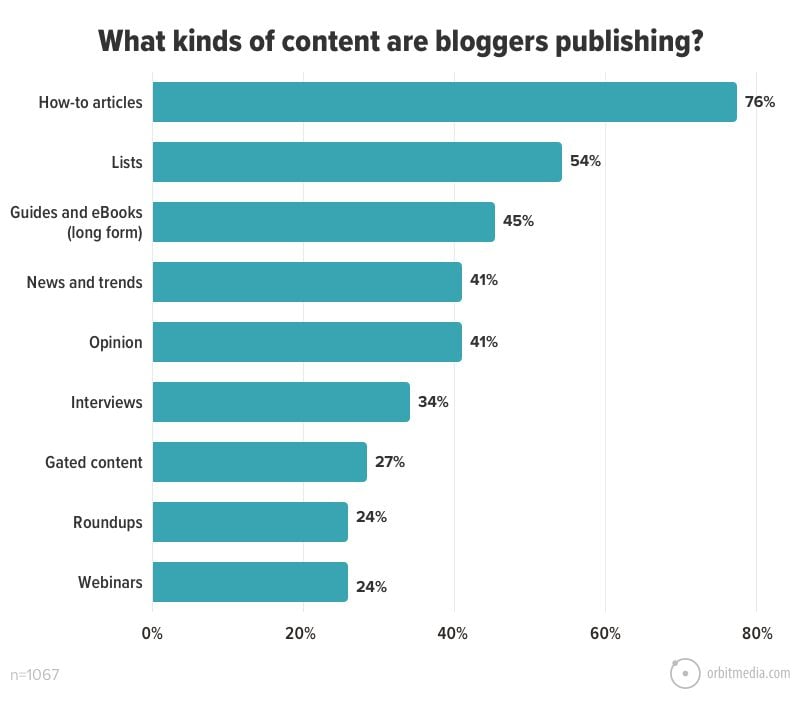
When we overlay the format question with the results question, we see an inverse correlation between the popularity of a format and "strong results."
- The most popular format, how-to articles, is the least likely to correlate with success.
- The least popular format, round-ups, is the most likely to correlate with success.
For the most part, the least popular formats are the most effective formats . Perhaps this simply shows the advantages of counter-competitive strategies.
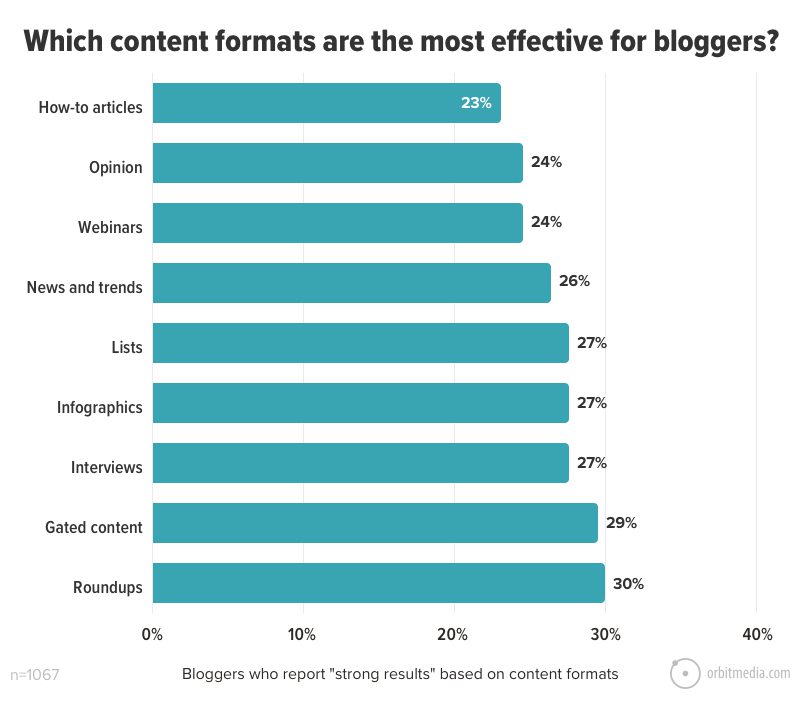
5. Trends in blog images: How visual are blogs today?
Virtually all bloggers add images to their posts. But how many? Most bloggers add just a few. A very small percentage of bloggers publish highly visual content with 10+ images per post.
Sound like a lot? The average post on this blog has 17 images.
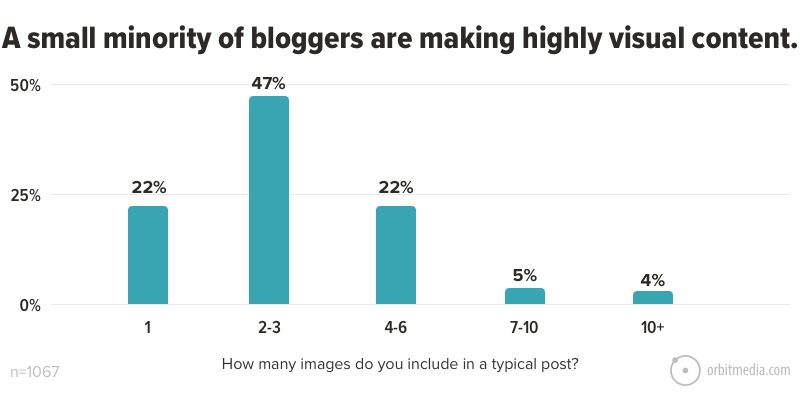
Here again, big blogging efforts pay off. The bloggers who publish content with tons of pictures are the bloggers who are the most likely to report "strong results."
Never underestimate how impatient internet users are to find relevance and get answers. Visuals make content easier to consume.
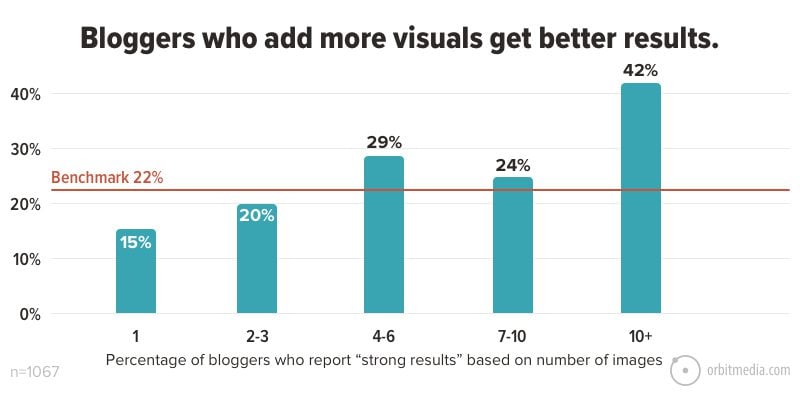
6. Are bloggers conducting and publishing studies?
Research pieces, like this one, are special. They make the blog the primary source for new information and are central to the most effective content strategies. So we asked if bloggers conduct and publish original research and learned that the format become more popular over the last few years.
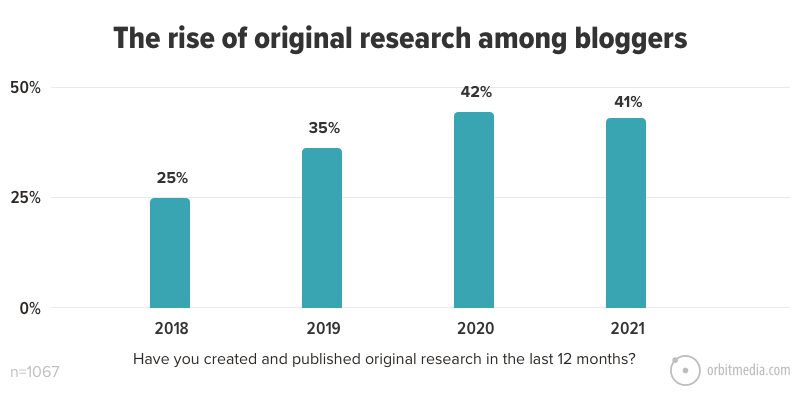
Before jumping into a survey project like this one, consider this tip from Michele Linn. Conducting, publishing and promoting original research is all she does.
 | Michele Linn, Mantis Research"Do you want to include survey-based research in your next blog post? Don't start by writing the survey questions! Instead, look for other research that exists in your space. The best original research explores questions that haven't already been answered with data. If you can find your niche and be that source, your research can be a wonderful source of backlinks. " |
7. How do bloggers approach headlines?
Headlines are so important that we ask this question separately: How many headlines do you write before choosing one? The data shows how hard bloggers work to write effective headlines and if the extra work correlates with results.
- Most bloggers write just a few draft headlines before choosing one.
- There really isn't any correlation between the number of draft headlines and results.
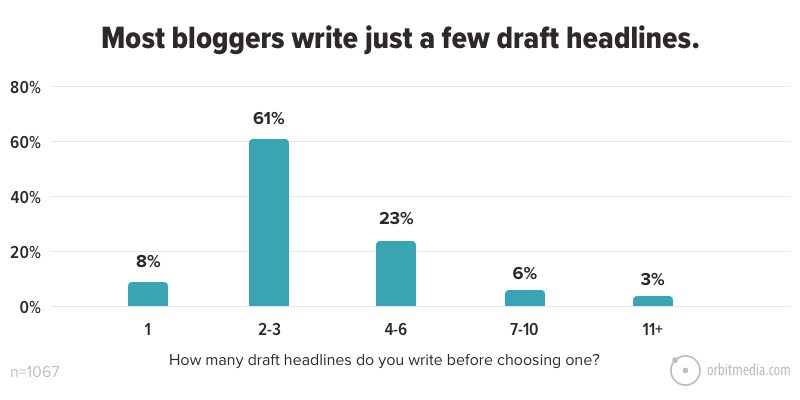
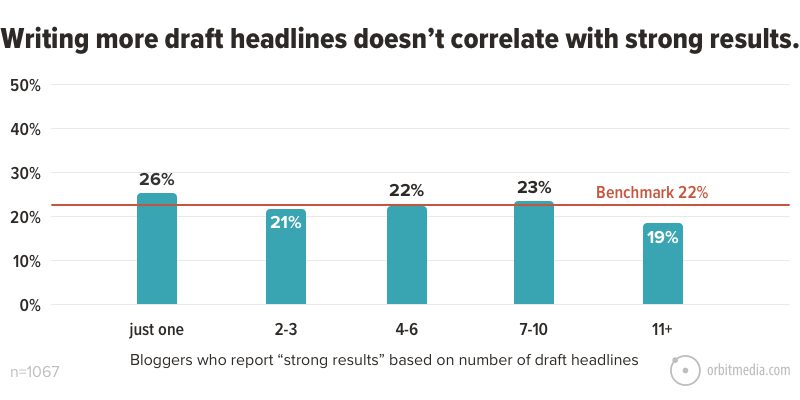
This was a surprise to us. Content marketing expert, Gill Andrews, offers one perspective:
 | Gill Andrews, Copywriter & Web Consultant"It looks like writing clickable headlines became less of a trade secret and more of common knowledge, thanks to hundreds of articles on this topic. Not to mention the headline generators and analyzers that make creating effective headlines even easier. So, it's no surprise that the headline writing skills of an average blogger have improved so much that they don't have to create many headline drafts to get their content seen. " |
Laurel Miltner, Director of Digital Strategy here at Orbit, offers another perspective:
 | Laurel Miltner, Director of Digital Strategy, Orbit Media"I had a hunch looking at these numbers that fewer headline drafts might correlate with a focus on SEO – and it does! Looking at individual survey responses, those who were more likely to research keywords were also more likely to write only one headline. So while writing only one heading might seem counter-intuitive to success, in fact, that success is likely coming from ensuring a keyword-optimized headline from the start. " |
8. Trends in editing: Do bloggers work with editors?
For seven years, the percentage of bloggers who edit their own work declined. Year after year, fewer bloggers are using an informal approach to editing.
Suddenly in 2021, it jumps back up…
So why are bloggers going it alone this year? Were budgets cut? Was it because of Covid-related remote work trends? Are more bloggers just working in isolation? Maybe. We'll ask the Covid question in a minute.
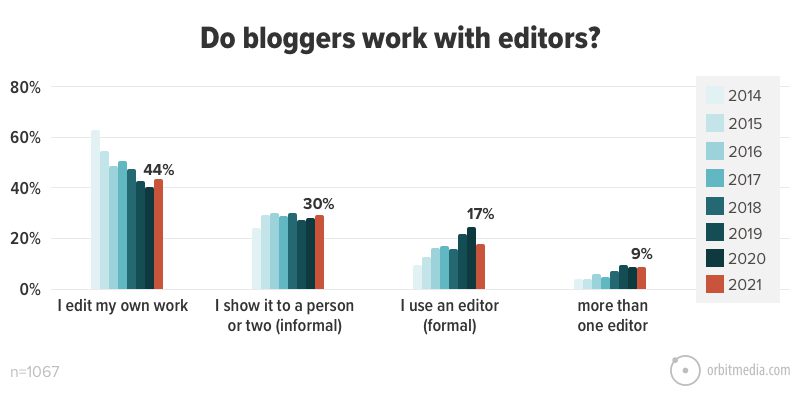
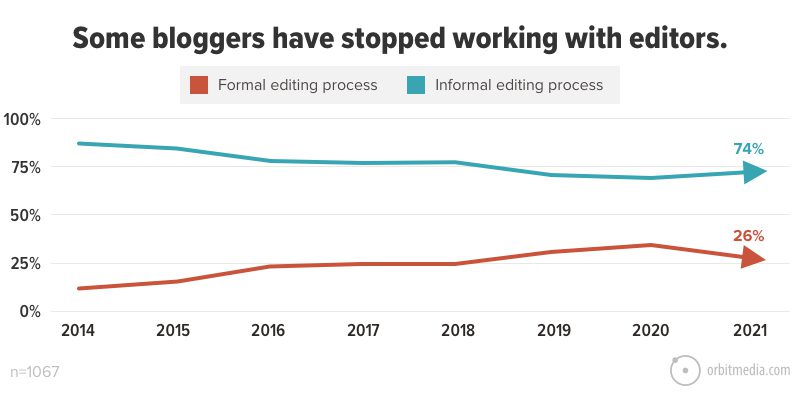
Editors are clearly adding value. Bloggers who work with editors are twice as likely to report "strong results." Jodi Harris, content expert and editor of the Content Marketing Institute blog explains this value.
 | Jodi Harris, Content Marketing Institute"While tight budgets and resource cutbacks are common these days, editing is one area where content marketers should never skimp. Even the most skilled writers can struggle to edit their own work; without an editor's trained eyes to objectively review your brand's stories before they're published, you risk leaving behind typos, misspellings, broken links, or (worse) misinformation. At a time when the stakes are high – and competition is even higher – even minor mistakes can erode consumer trust in your business, preventing you from reaching your marketing goals. The quality of your content should be a point of distinction – make the effort to invest in it." |
9. Trends in content promotion: How are bloggers driving traffic to their posts?
Every beginner blogger quickly discovers that quality content isn't enough. Content needs to be marketed. The best content doesn't win. The best promoted content wins.
We asked bloggers which of the five main promotion channels they use to drive blog traffic: social, search, email, influencers and paid.
This year, our blogging statistics show a dip in all channels except for SEO. Social is still the most popular channel (possibly because it's easy to do the basics) and influencer outreach remains the least popular (possibly because it's more intimidating).
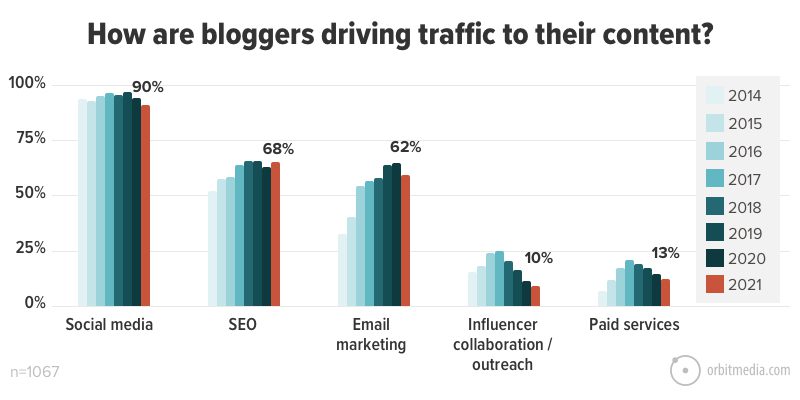
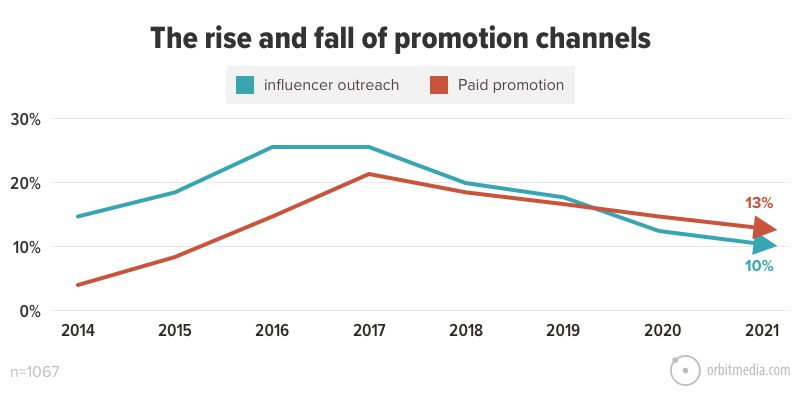
How do the various promotion channels correlate with results? Although influencer collaboration is the least popular promotion strategy, it's the most likely to drive results . Again, the same pattern. The least popular thing is the most effective thing.
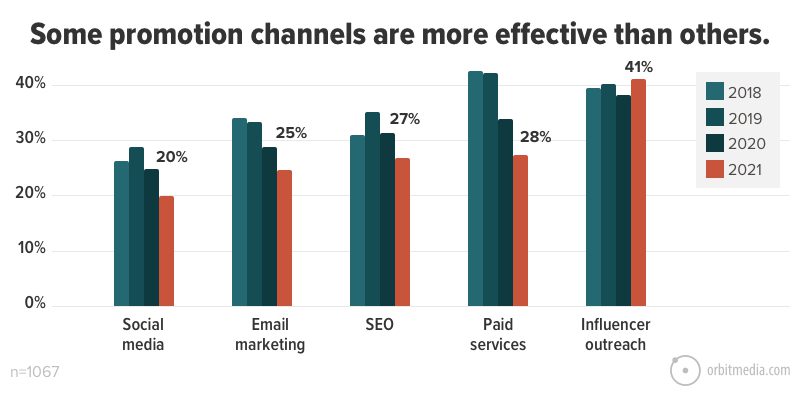
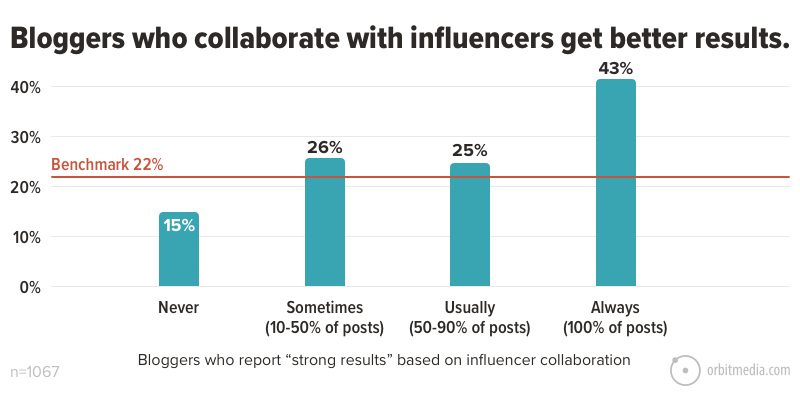
We have two perspectives from two champion content marketers, both experts at content promotion.
 | Ross Simmonds, Foundation"These numbers are fascinating to me because you can see the effectiveness of email marketing & social media dropping each year. Why is this? It's my belief that in 2018 both our inboxes and social media feeds weren't as noisy as they are today. As these channels become noisier and noisier (and arguably even more competitive) the bar for standing out gets higher. It's more difficult than ever to actually see strong results from these channels because they're highly competitive and very noisy. Does that mean these channels aren't worth embracing? Not even close. It means we need to prioritize content excellence across the channels we choose and recognize that what worked in 2018 won't work in 2023." |
 | Jay Baer, Author, Keynote Speaker, Thought Leader" There's no shortage of bloggers or blog posts. In this environment, the contest may be about promotion rather than creation. It's fascinating that whereas new Salesforce research suggests 93% of companies will use influencer marketing in some form by the end of next year, only 10% of bloggers are doing so. Even more remarkable is that influencer marketing and related collaborations score highest as a promotional tactic among the few bloggers who are using it. There appears to be an unmined vein of opportunity for bloggers, and it's influencer marketing (at least for now). " |
Struggling to get traffic? Check out our list of 76 ways to drive traffic to a blog post. It goes way beyond the tweet and the Facebook share. That should help.
A related question gives us the blogging statistics for traffic sources. Search is up; social is down.
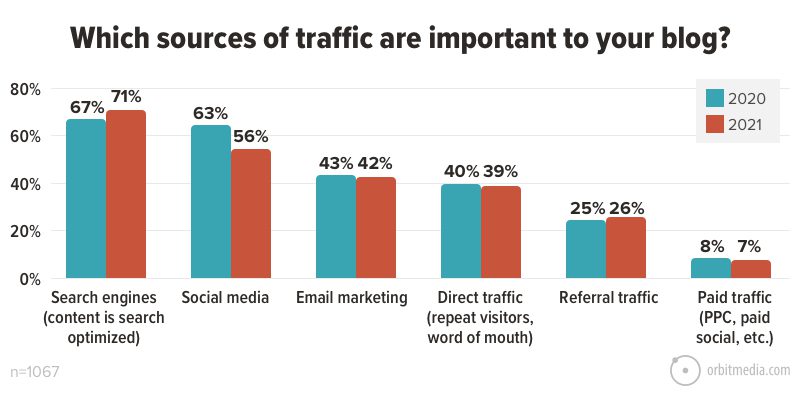
10. Trends in SEO: Are bloggers researching keywords?
Most bloggers are optimizing content for search engines, but some are clearly much more focused on search than others. This next question shows what percentage of bloggers research keyphrases.
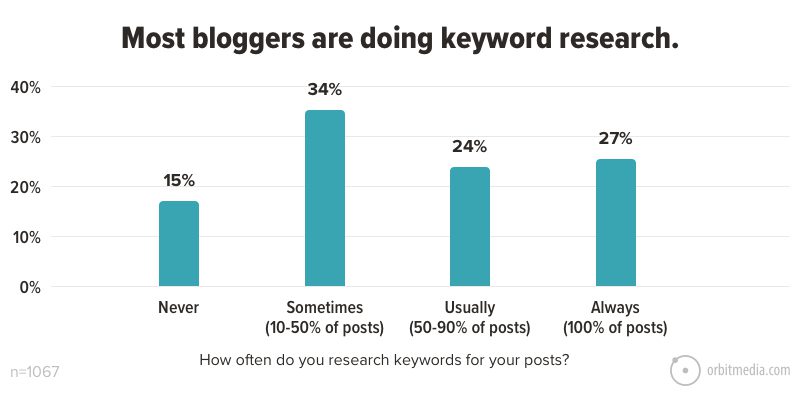
Although it's encouraging to see bloggers aligning pages with phrases, it's hard to imagine search optimizing every single post. Not every post is an SEO opportunity, right? Not every topic is searched for. Some of the best content has nothing to do with search. Search is about meeting expectations. But some content is great because it is unexpected.
Still, bloggers who consider keyphrases more often are more likely to report "strong results." It's a direct correlation.
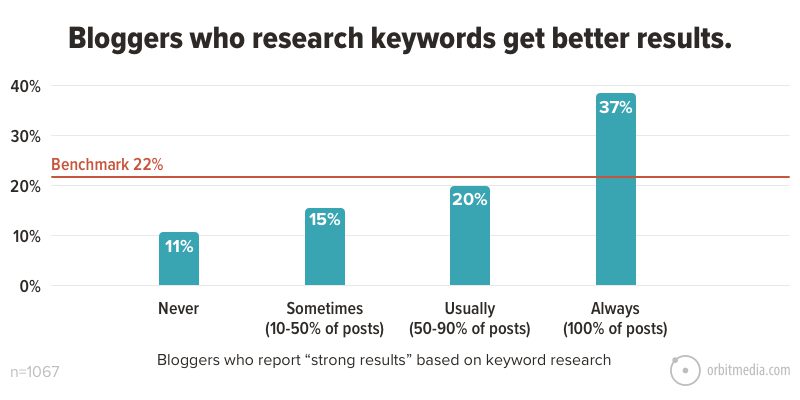
 | Kameron Jenkins, Content Lead, Shopify"The key reason why bloggers who research keywords get better results comes down to distribution. Without distribution, even the best content won't get seen, and keyword research unlocks one of the most reliable distribution channels there is… Google. Keyword research forces you to think about how your content will get found before you start writing — what does someone searching for this word or phase want to find, and how can I deliver the best answer on the topic? It's not the only distribution strategy or way to write content, but it is one of the best ways to earn sustained, passive traffic long after you hit publish." |
11. Trends in Analytics: Are bloggers measuring results?
Here we see a huge drop in the percentage of bloggers who ignore their own data. Just 3% of bloggers never or rarely check Analytics. Pop the champagne! We've turned the corner.
Most bloggers check Analytics sometimes. 29% of us check the performance of every post.
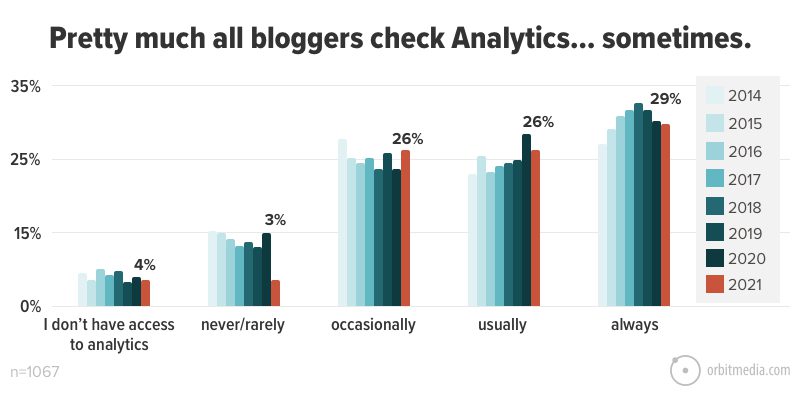
Another direct correlation. The more consistently the marketer measures success, the more likely they are to succeed.
Blogging without Analytics is like playing sports without a scoreboard. You can do it, but not seriously. You'll never be a serious competitor.
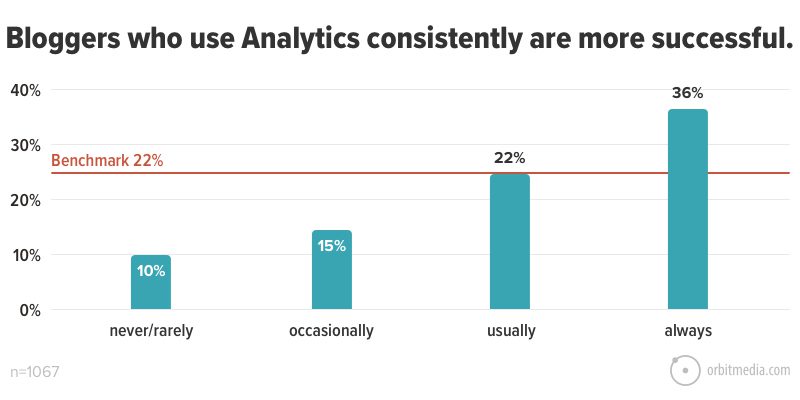
 | Dana DiTomaso, Analytics Pro and President of Kickpoint"It absolutely makes sense that bloggers who frequently check analytics have better results — how else would you know if your content is resonating with your audience? Social shares can be misleading, plus there is the silent majority of people who never comment or post in public, but absolutely read posts and share them privately with friends and colleagues. Knowing what's working for you helps you sharpen your focus and spend your blogging time more effectively." |
12. Trends in content management: Are bloggers updating their old posts?
Another powerful blogging strategy that deserves its own survey question. The simple approach is so effective, we wanted to learn how common it is.
It is a popular strategy and getting more popular…
Each year, more content marketers are going back into their blogging platform (WordPress, for most bloggers) and upgrading old articles. Certainly, SEOs know the power of updating old content, instead of writing new articles.
It works. Bloggers who embrace this strategy are nearly 3x more likely to report "strong results."
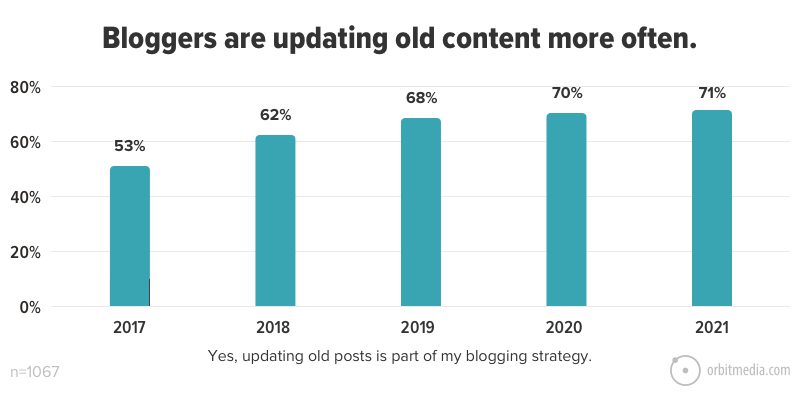
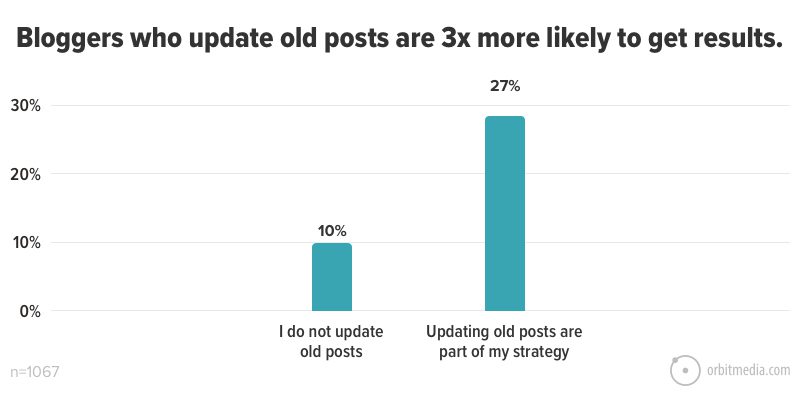
Here at Orbit, once we discovered the amazing effectiveness of updating post content, we went all in. Today, around a third of my "new" articles are actually rewritten old articles. We're recycling old, authoritative URLs with great results.
13. What are the big challenges for bloggers?
Again and again, in statistic after statistic, the survey data shows that the bloggers who put in 10x efforts are winning. Frequency, consistency, visuals or length, the top bloggers are going big in some way.
The moment you realize that 10x efforts are what really drives marketing outcomes, the next thought is often "But who has time for that?!"
That question may have crossed your mind several times in the last few minutes.
So it's not surprising that time is the biggest challenge for most bloggers. They know what to do, but struggle to find time for content creation and promotion.
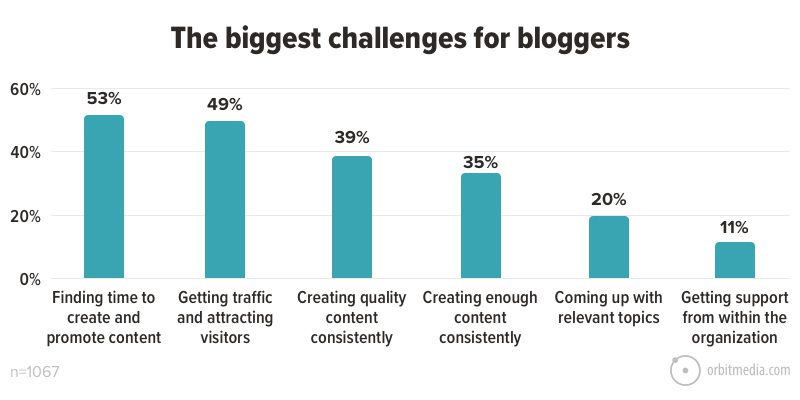
Attracting blog readers is the second biggest challenge, followed by creating quality content consistently.
We'll wrap up this year's analysis on a practical note to guide decisions about content strategy. Here we've indexed the top challenges with practical tips for overcoming each, based on the data above. For each, you'll see that the first tip is for big business types. The second tip is general. The third tip is personal.
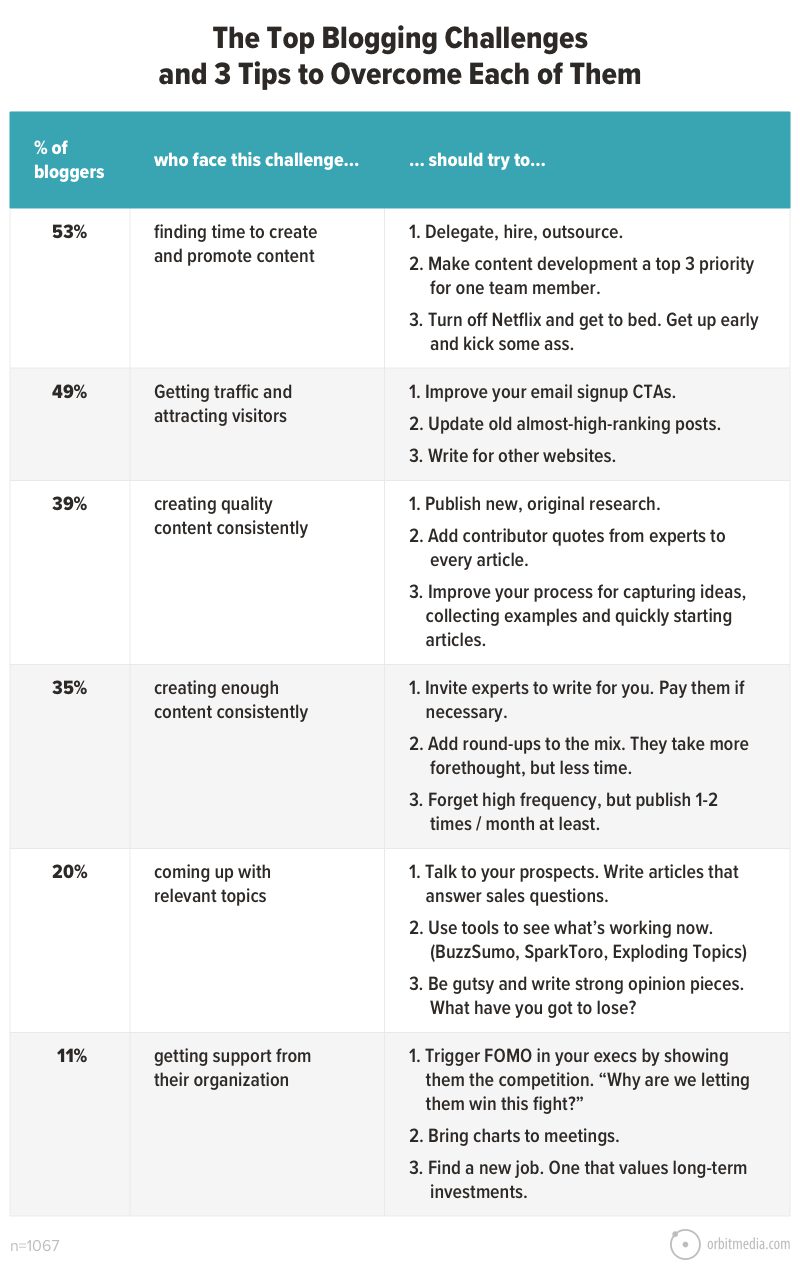
Whether you're a B2B marketer, a B2C marketer or a personal blogger we hope seeing these trends and stats inform your content marketing strategy. It doesn't matter if you're doing business blogging on a corporate blog targeting B2B buyers or creating custom content for your clients inbound marketing, applying these insights will help you have a more successful blog.
We'll close with a quote from expert, veteran blogger Heidi Cohen:
 | Heidi Cohen, Actionable Marketing Blog" To create measurable results that contribute to profitable sales and build your addressable audience, your blog needs both dedicated human and financial resources. But– there's NO "one-size-fits-all" blogging solution. To be successful in today's information-stuffed world, create keyword-focused content with visuals and data, publish on a consistent weekly schedule, promote your new and best existing blog posts regularly across devices (including voice), platforms and formats over time." |
Hang in there! Stick with it! Go big in some way and be consistent over the long term. It's worth it.
14. BONUS! How has COVID affected bloggers and content marketing?
We were curious. So we added the COVID question. Here's the data.
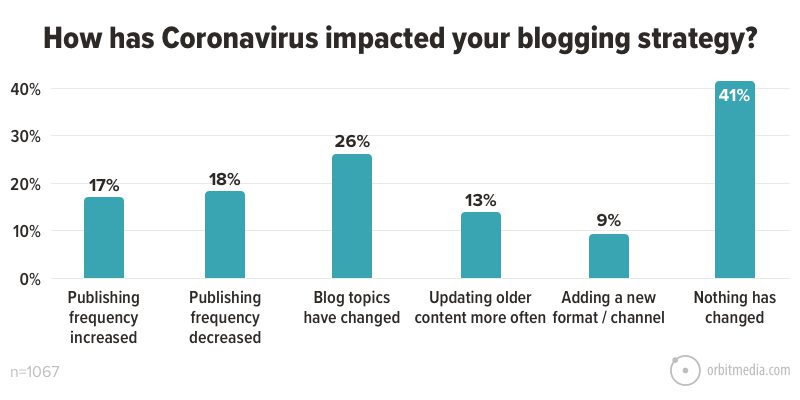
Thank you, bloggers!
Thank you to the 1067 bloggers who responded. You spent 3 minutes and 19 seconds on average (that's our final statistic, I promise) and you shed light on a dark corner of the world of content.
Also, thanks to our expert contributors. I recommend following, subscribing and reading each of them. We are grateful for their insights and promotion help.
And huge finally, thanks to Amanda Gant and Janzten Loza and all of my family of Orbiteers!
Methodology and data
The respondents to this survey are self-described bloggers with whom we connected over many years on social media and at live events.
- The data set is heavily populated with my personal network, which skews toward LinkedIn users, B2B marketers and people in the US
- Responses were gathered in September of 2021
- This is a survey of bloggers (individuals), not companies or brands (groups)
- No one was incentivized to take the survey in any way
Data was captured using a simple one-page Survey Monkey survey of 20 questions. Early versions of the blogging statistics and trends were sent to influencers to gather insights.
How is this survey promoted? Read our original research playbook here.
Financial Blogging How To Write Powerful Posts That Attract Clients
Source: https://www.orbitmedia.com/blog/blogging-statistics/
Posted by: daleytherning.blogspot.com

0 Response to "Financial Blogging How To Write Powerful Posts That Attract Clients"
Post a Comment